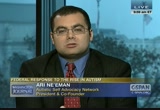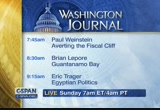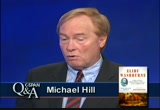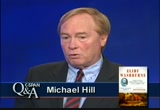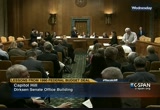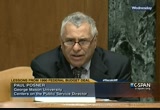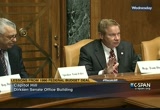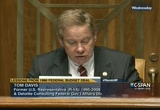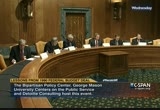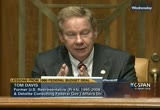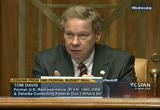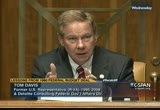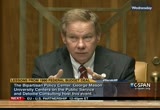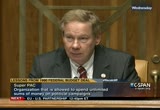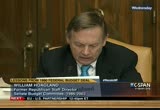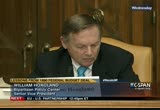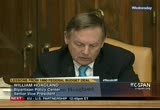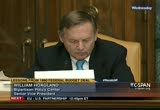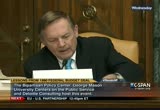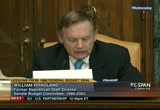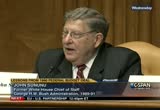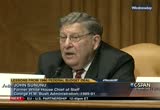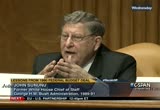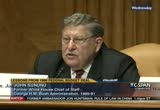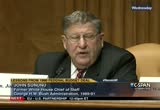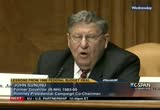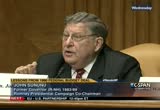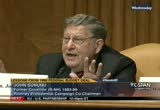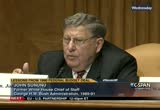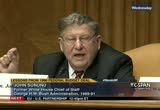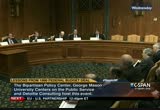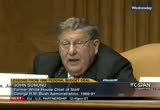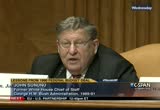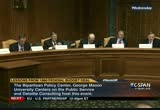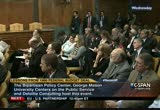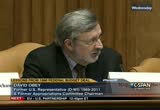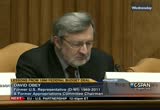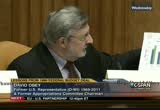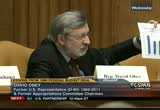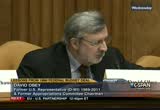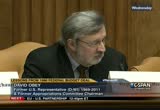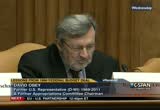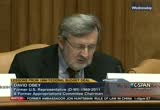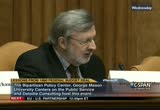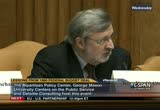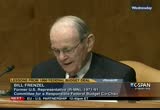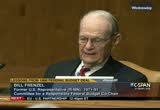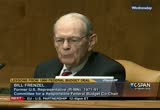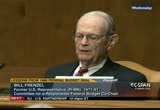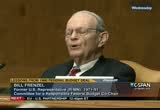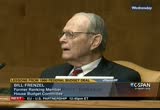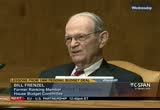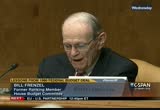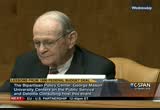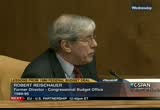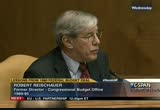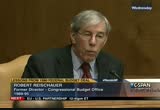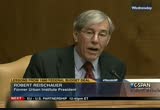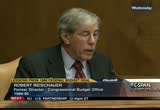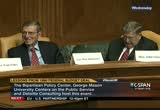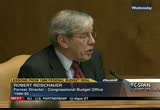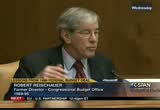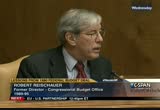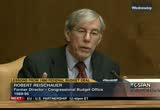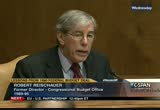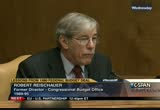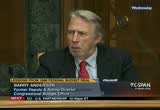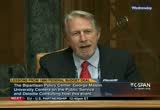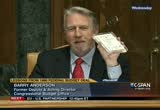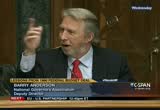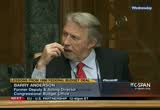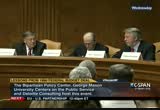tv Washington This Week CSPAN December 1, 2012 10:00am-11:31am EST
10:00 am
our community needs to be filing these complaints when we are discriminated against so that we can engage in that follow-up if people want to help us. our community faces real civil and human rights challenges. we can face them together. host: ari ne'eman is president and co-founder of the autistic self advocacy network. it is a nonprofit organization run by and you can go to their web site at autisticadvocacy.org. >> you want to tell our viewers and listeners what to expect. we begin with a conversation einstein on thesc
10:01 am
simpson-bowles commission. later on we will be talking about the defense capabilities section georgia at the government accountability office regarding whether it detainees at quintana mold they can be kept at one of six u.s. detention facilities on the mainland. -- at guantanamo bay and whether they can be kept at one of the six u.s. detention facilities on the mainland. this is in it. we will see you again tomorrow morning. [captioning performed by national captioning institute] [captions copyright national cable satellite corp. 2012]
10:02 am
>> coming up today, and look back at the 1990 budget deal followed by the president of the european parliament on the eu and u.s. partnership. later, jon huntsman talks about the role of la in china. -- rule of law in china. >> washington worked his way up. at the urging of one of his brothers he immigrated out west where the lead mine industry was in may paid a. he arrived in a ship, by stagecoach. he arrived on steamboat in this muddy town. he established a lot have been
10:03 am
in slowly worked his way up. he became a very successful lawyer and then became involved politically. he ran for congress, search for eight terms. in any profession did abraham lincoln -- served for eight terms. as they arised, they were a close colleague during the civil war. after grant was elected president, initially appointed washburn secretary of state. at that time he became very ill. his family actually feared for his life. after about 10 days he submitted his resignation to president grant. grant accepted his resignation. over the next several months he regained his health which was always very fragile. he then offered him the
10:04 am
position as minister of france. >> michael hill on the minister to france during the 1870 franco-prussian war. they provide political and humanitarian support. sunday night at 8:00 on c-span. >> former congressional leaders discuss what washington learned from the 1990 deficit agreement that eventually helped frame the federal budget into surplus. speakers include tom fully. this is just under three hours of. >> ok. welcome. i am the director of public
10:05 am
administration program. i want to welcome you to the session, which we are calling looking back to move a forward. this is co-sponsored by george mason university and the bipartisan policy center. it is our pleasure to put this on and to recognize with all the frenzy about the fiscal cliff that we have a history. some of the history is successful in resolving deep seated hard choices. that is will we will look back and talk about today and see whether we can learn any lessons from the experience. we will go over the detailed program in a few minutes. i want to introduce our keynote speaker tom davis. he has covered many basis. he was the county executive of fairfax county. he was the representative to congress and became a chair and it did many important hearings and remains very active as a speaker and a policy observer. he is also on our faculty where he teaches a course on southern
10:06 am
politics that fills up five a minute after students get to register. a very popular lecture. tom will kick it off and i will come back and talk about the detailed program and we will give started. >> thank you very much. i left congress undefeated and unindicted. i just want to welcome you on behalf of george mason university, the bipartisan policy center. mark twain once said history does not repeat itself, but it's sometimes rhymes. i think that summarizes what we are trying to do. with a fiscal cliff approaching and leaders working to explore
10:07 am
an agreement that would avoid an economic free fall while securing progress in securing the long-term debt, we will go back in time to better understand the better prospects. we will look at the last time both parties joined together in a bipartisan summit. the 1997 brought all key players, members and staff in what resulted in a successful five-year agreement. congressional democrats and george bush agreed on a package saving over $500 billion over five years. they locked in discipline for the future by achieving major process reforms including an adoption of discretionary spending caps on the mandatory revenue sides of the budget. there were doubts about whether it could be done. skepticism always flourishes
10:08 am
when the stakes are high and leaders are presented with hard choices. congress rejected the first proposal, but they persevered to complete the project. we will be hearing from two panels. the first will consist of many of the principles of the first agreement. the second will reflect on lessons we might take away from the historical agreement for today poses challenges. we suffered no illusions here. the past is unnecessarily prolonged. there are many differences between the environment in the budget of 1990 and today. today's parties are more polarized than they have been in decades and there are macro trends that make the divide even deeper. the difference is, the parties
10:09 am
today are will recall ideologically sorted. according to the national journal, the most liberal is more conservative than the most conservative democrat. by the way, olympia snowe, the gap even gets wider. some of the more liberal republicans are leaving the house. that device gets even deeper. the parties are ideologically sorted. complimenting that, reinforcing that division are three other major factors that did not exist in the 1980's. the way congressional districts are drawn with computer models today, most districts are pre drawn to elect one party or the other. that means most of us in the house or about primary
10:10 am
elections, we do not worry about the in general elections. my experience has been primary voters punished compromise. there is a slew of former members that had higher aspirations that can testify to that. when you take a look at the redistricting this lost time, even two years ago and then to a 2010 when you had the highest turnover since 1938, less than one-quarter of seats were in general contention. reinforcing those are what i call macro trends. the fact that the media models are far different than they were 20 years ago or even 10 years ago. you did not have a fox or msnbc. people now tune in to what they want to hear and get their views reinforced. talk radio was beginning to flourish, and you did not have the internet. the crap to content ratio is very high.
10:11 am
only 50% get their information off of the internet. they get things passed along. these are not what i would call a first to bring us together. they tend to be polarizing mechanisms that make it more difficult to achieve compromise. if the speaker were to cut a deal today, by the time he was back on capitol hill, if shawn kennedy or rachel maddow did not like it, switchboards light up. it makes it difficult for members. one other factor has come in. these are not what i would call efforts to bring us together. these make it more difficult to get things, rise. if a speaker were to go off and
10:12 am
cut a deal, if rachel maddow did not like it, member's phones light up like a christmas tree. it makes it difficult for members. there is one other fact that is not talked about as much but it's equally important. that is the fact that campaign financing has changed. we have passed landmark campaign finance reform. i did not vote for it, i am happy to say. the difficulty with that is its tries to take money out of politics. it limited money to parties who limited how they could make money. that money did not disappear from the political process. it moved and now it is out in super pacs. you have more money now coming from third-party groups then you do from political parties and candidates combined. what does that mean in the mind of a policy maker sitting down and looking at a deal? member after member look at me and say, i am scared to death of one of the super pacs. leaders lose their leverage in
10:13 am
terms of how they can help members. these others on the outside in the right and the left are in power. these are factors that did not exist that makes the solution today more complicated. i think many have lost confidence in the ability of our politics to solve the problems we face. it is healthy for all of us to remember we have faced these choices before. we serve with people who were there who were good, able people. we have friends that are working to make it more difficult will arrive at a decision the good news for americans is that these problems are solvable. they are politically difficult, politically hard, but they are solvable. we are very hopeful in the coming months that something can be resolved in a number of these areas. i hope you enjoy this forum
10:14 am
today. we have got a great panel here to lead us off. witnesses and participants to the first agreement back in 1990. i hope you enjoy it. >> thank you. just a few words before we get started with our first panel. this meeting today is the first project of a commitment we made to do an oral history, or a multimedia history of the federal budget process. as important as these decisions are, it has not been done and not captured. as you will see today, there is a rich history and the memories of people we have assembled here. it has contributed to keeping the fiscal policy going in some reasonable way.
10:15 am
we want to capture both those staff-level kinds of experiences, as well as the experiences in budgeting where leaders get together and try to make hard choices. this is the first of a number of sessions like this we hope to conduct. tom has told us these are not easy politics. it is probably just as difficult in 1990 and may be more difficult today. all of us have our own way to solve the fiscal cliff. we could do it in the shower. the problem is there are only 536 people in town who have to do it in a way that is palatable to the nation's public. that is not easy. we thought it would be useful to review the significant budget compromise that was achieved in 1990. not that there was not one in 1997, but this was the most
10:16 am
significant one that caught the mold for future budget agreements, not only in terms of items on the table, but the budget process elements that were agreed to, the walk in restraint. we really want to understand how compromise was made, where were the key players. how do you make hard choices with the glare of 247 media coverage and polarization, and how do you do it in a way that guarantees some political success? that is the real challenge we want to understand today. we were fortunate to have teamed with the bipartisan policy center and bill, our partner here.
10:17 am
he will moderate the first session. we have brought together, we are still waiting for the former leaders who were there at the summit. at the air force base as well as forums around washington, to craft this deal. it was not an easy deal. as we will hear, it is powerless to succeed. it lost a couple key votes in the house. ultimately, it was agreed to. we will hear about the issues, how to be resolved in the first panel. the second panel will be looking more at lessons learned. for today. we will assemble a panel of media observers and other thought leaders in washington and elsewhere. we should be done by noon. with that, i guess we are waiting for the speaker. i do not know if we want to go ahead. >> is fine to go ahead. he will be here shortly. >> ok. >> good morning. it is a real pleasure for me to moderate this panel of very
10:18 am
distinguished americans and public servants. thank you, congressman, for your presentation. i had the honor of serving as a senate staffer here for nearly 27 years. almost all of that time was spent here in this committee room. working for the chairman. i never sat up here. i can tell you that. during that time, we did many budgets. bills were debated, discussed, and some were adopted. one of those pieces of legislation, 22 years ago, was the budget reconciliation act of 1990. that implemented the budget agreement negotiated over many
10:19 am
months. we are fortunate to have with us on this first panel, some of the key participants in that debate. unfortunately, two key individuals, senator robert, at that time, a director, and dick, are no longer with us. we cannot understate the critical role both played in this debate, whether one agreed or disagreed with them. the further back one looks, the further ahead one can see. we will look back on budget deliberations with an eye on looking forward. are there any lessons to be learned from that time that might apply? let me set the stage a little bit for the audience and some of us to refresh our memories.
10:20 am
as one grows older, the memory gets more fuzzy. the congress was controlled by the democratic party. in the house, there were 250 democrats and 183 republicans. a margin of 67 votes. today, in the new 113th congress, that is flat, with the majority controlled by republicans, with a split of 49 votes. in the senate in the 101 congress in 1990, there were 55 democrats and 45 republicans. that might sound familiar. that will be the make up of the next congress. the republicans sat in the white house in 1990.
10:21 am
those who recall this debate like to focus on the 11 days in september 1990 when 26 congressional and administration officials were sequestered away at the air force base to find an agreement that would replace the sequester confronting the country that fall. those of us who support staff peace negotiators, will recall this was pretty much before cell phones. the food was good. at the time, one participant said, maybe the time would have ended a lot sooner if the food was not so good. it was not going to end before
10:22 am
the prime rib night rolled out. on monday night, we had our prime rib and we left andrews. anderson, who will speak for the departed, developed t-shirts that reflected our dissipation. the journey was much longer than those 11 days. it began in may of that year. it's stretched from the conference room at the white house to the converted officers bar at andrews air force base, and finally to a conclusion in the private dining room in october. the speaker will be here shortly. he will present his views on this. along the way, there were fears in the economic disaster. they were raised, if the
10:23 am
scheduled sequester was triggered at that time, and that sequester at that time, as estimated in october, 1990, was there would be a 31% reduction in defense spending and a 35% reduction in non-defense. triple the size of the sequester that faces the country here in january. at the same time, the deficit for fiscal year 1991 increase in the budget in february when it was submitted -- >> 31%? >> yes. >> where did it come from? >> it grew out of the 1985 legislation we adopted. the deficit estimate had increased to nearly $300 billion by the end of 1990.
10:24 am
all of this was in the mists of saddam hussein invading kuwait on august 2. these gentlemen were there. it came down to something extremely familiar to everyone in this room. that is taxes and spending. more specifically, the desire of the president's was to have a capital gains tax cut. democrats would only agree if the overall rates were increased. no such agreement could be reached. democrats retreated on the rate increases while setting for a limitation of tax deductions for
10:25 am
high-income filers. sound familiar. each of these distinguished panelists will give their recollection of the budget. its prose at its cons, at its pitfalls, and most importantly, what lessons from that experience can be applied today. i am sure they will want to interact with each other. we will open it up after each one makes opening comments they want to make. then, if time permits, we will certainly open it up to you and the audience to ask any specific questions you might have. in the absence of a speaker at this moment, i would like to proceed with the honorable governor, a former chief of staff, at this time. governor sununu, welcome.
10:26 am
>> thank you. i have never sat at this table. thank you. >> i sat here a lot. >> i think this is a very interesting coincidence in history and time to have us here discussing the 1990 budget agreement in the context of what is happening today. i want to, right from the beginning, acknowledged what i believe was the very instrumental leadership roles of folks like speaker foley and george mitchell, bob michaels, and bob dole. there is no question none of this could have happened without
10:27 am
them coming to the table and understanding how important it was to achieve a result. i also have to emphasize what i believe is the fundamental catalyst for all of this. that is there was a president who was determined to solve this issue. absolutely determined. as we see, not only was he willing, but he ended up sacrificing tremendous political capital, personal political capital in order to do what he felt the country needed at that time. there are a lot of folks who like these kinds of agreements to take place in a climate where there are no politics. it will never happen. it will never happen because politics is the cement that holds the system together, not what divides it. in my opinion, there are three
10:28 am
political aspects that have to be looked at in what happened in 1990 and certainly have parallels to what is going on today. there are the politics of the differences in philosophy. there certainly is a liberal perspective, generally attributed to the democratic party, a conservative perspective contributed to the republican party. there is nothing wrong with having differences and commitments to different philosophies. the second slice of that is the detailed differences with and that separation of two principal philosophies. to a great extent, the negotiating of and a budget agreement, you have to understand the internal are the differences, the details that are absolutely important. in creating and crafting a majority that can allow
10:29 am
something to take place. there is nothing wrong with those. finally, there are a third set of politics. that is the politics of personal agendas. i will not credit that third one with the same point i made on the other two. sometimes, there is a great deal wrong with that aspect of politics. all three of those are in place today. all three of those were at play in 1990. to a great extent, the president's the big man was certainly triggered by the sequestration obligation that followed. just so, i think it is an important historical note for me to emphasize that there was a meeting in the white house in the spring of 1990. nick brady, secretary of
10:30 am
treasury, invited a number of the central bankers who were in washington for some of the international banking meetings, to come to the white house for a reception. i think at that reception, the president heard the serious concerns of the financial community around the world that this country needed to have a multi year but it that followed on what they had done, and what provided the framework for stabilizing the financial situation in the u.s. i believe the president after that spring meeting really resolved to provide the leadership to make this happen. bill has talked about the time line. it started with a meeting in may where the president invited the congressional leaders down to the white house on may 10.
10:31 am
we started with an initial negotiation on may 14. the process really took a little bit less than six months from the time it was triggered in the white house to the time the legislation was signed. that may sound like a long time. considering how long we have been struggling over our recent battles, it seems with a little bit of hindsight to be fairly efficient in terms of that process. i would like to talk a little bit in more detail about the fact that they're really two
10:32 am
agreements. the fact that there were two agreements, the reasons for them, the way they were achieved, and the implications of the two agreements, really have a great deal of information and a great deal of lessons to understand how to do and perhaps how not to do what we need, to accomplish in the current climate. an initial agreement, which met the criteria of what the president wanted done, but more importantly, in the process of working with the republican members of congress, the president had directed to make sure we understood what republicans in the house and senate felt were required for them to support the agreement. in particular, the most
10:33 am
fundamental issue was that there be no increase in tax rates. a familiar point if you read the headlines today. the republicans in the house and senate said they did not want to increase the tax rate. secondly, there had to be two or three, at that time we were talking three or four to one. in terms of cuts to spending to the revenue raised by whatever we did on the tax and fees side. in that process, we set up a procedure on the senate side with the senator, and phil was in close communications with bob dole and other members of the republican side that cared about the budget. on the house side, bob asked us to deal with newt gingrich. so i had an informal arrangement with both that we would run the process through
10:34 am
them. they would participate in the negotiations. when we got to a point we felt the president was willing to compromise on issues, we would run that process through. the first agreement was achieved. it has been noted it had no increase in tax rates. no increase. the additional revenue, generated by mostly consumption taxes on gasoline, luxury taxes, there were additional revenues specifically fenced off, which were produced by increasing the payroll tax. there were additional revenues fenced off for medicare by extending the cap on medicare. at that time, it had a gap. all of the other taxes in there were primarily related to use or consumption. it met the criteria established by the republicans in the senate and the republicans in
10:35 am
the house. we presented that to the committee as a whole. to the participating members of the republicans but dissipating in the process on the house and senate side as a whole. i had a specific conversation with both gramm individually and gingrich individually. it was agreed we had met the criteria. i am not positive of the numbers. i believed it was something like 375 or $380 million in cuts. $125 million in revenue in the first package. roughly three-one. the white house was under the assumption this was acceptable, everybody we had contacted who was part of the process agreed
10:36 am
to it. we sat down with the democrats, confirmed to them that we had a deal. tom and george mitchell went back to their much larger gaggle. they had the majorities in the house and senate. finally, the leadership in congress, the democratic leadership, the republican minority leadership in congress, and the president, agreed we had a deal. that went to a vote. that was going to go to a vote. in between that process, we began to hear rumbling. some of the more conservative members of the house led by speaker gingrich were uncomfortable with the fact we could never identify what, specifically they did not like. the, always came back, it had taxes. everybody knew from the very beginning after the initial process started that there would be a balance between
10:37 am
revenue and spending of roughly three-one. everyone was invited to the rose garden. history has well documented the fact that newt gingrich came to the meeting. everyone thought he would join in the rose garden. he did not. the president announces the agreement. it goes to a vote. early october. it is defeated by a coalition. conservative republicans and liberal democrats. the president is committed to have a package. we sit down again. this time, recognizing we probably have to negotiate a
10:38 am
package that is more favorably inclined to the democrats. there is no way we could get less taxes than we got in the first package. we negotiate a new agreement, which, in my opinion, was far less good than the first package. the new agreement did cut tax rates. it shifted about $30 billion of the five-year savings. $30 billion from the spending side to the revenue side. those are the final numbers, $350 billion and 140 to 150 billion in revenues. we did have to yield on tax rates. in exchange, we did get a cap on capital gains at 28%. let me talk a little bit about the tax rates side. i think even the change in tax
10:39 am
rates has not been well understood historic the. the rates at that time or low income rates of 50%. in the middle range, 28%. that extended out to what we now call the wealthy. on top of all of that, there was a bubble in the middle. everyone forgets about the bubble in the middle, which was a middle-class tax rate. it was 33%. millions upon millions of americans were significantly affected by that bubble rate. when we negotiated a change in the 28% for the wealthy, and raised it to 31, we were able to reduce the 33% for the middle
10:40 am
class down to 31. we now have a system of 15, 28, and 31. i stress that. now, with everyone arguing about the fact that the rates are critical issues to look at, that budget agreement so aligned actually cut those rates on the middle class from 33% to 31%. i believe there is one point that came out of the budget agreement of 1990 that is not talked about enough beyond the points i have raised. that is the critical nature of the budget enforcement act, which was part of that. as part of the agreement, as part of being willing to talk about revenue at all, the
10:41 am
president insisted and we were able to negotiate an agreement that provided a new piece of legislation under which congress would budget spending and revenues in the future. that was the budget enforcement act. it built into it very specific and deliberate pay as you go rules. with all due respect to my friend, president clinton, and
10:42 am
newt gingrich, who have been running around in recent years, patting themselves on the back, i truly believe the surpluses of the 1990's were generated by the agreement that came out of what tom foley and george mitchell and bob dole and george herbert walker bush did with the budget enforcement act, which required those budgets to make sure they did not spend more than they took in. i think the surpluses of the 90 or the best legacy of the budget agreement. i will stop there. >> thank you. let's turn to my old boss, the former chairman of this particular committee. a little factoid, he will remain in history as the longest-serving chairman of this committee because of term limitations placed after his departure. senator. >> thank you. thank you for your interesting remarks. it is interesting to see how things are similar and how things are so different. i want to say to all of you, my voice is not as good as it used
10:43 am
to be. they tell me i still have hopes of it coming back. my recollection is not as good as it used to be. i will not contribute as much. i do want to say i think this is an exciting thing to do i hope you finish it. i hope you put down what happened now, what happened then, what happened now, and what the budget players in congress actually did. i regret to tell you i have one additional reason for you to put it down this time. contrary to last time, i truly believe there is a chance that we will not only fall off the cliff, but we will break the
10:44 am
bank and the monetary policy of the world will go upside down and the very strong position of the american dollar will be put in jeopardy. i do not believe the players get it. i think they are so besieged by information that they do not think there is a chance this enormous deficit and debt, no matter how you figure it, it is enormous. i think there is a real chance something very bad will happen. i want to thank the governor and the speaker if he arrives. my first reaction in the 1990 budget is that it was a failure largely because it was a goal of turning a $200 billion deficit in to a projected surplus in 1994 was not achieved. by 1994, the deficit was over
10:45 am
$200 billion. when i supported the final budget reconciliation act the president signed into law november 5, 1990, to implement the agreement, it is true the fundamental issues we confront on taxes and entitlements spending were really not addressed. an agreement was reached largely out of exhaustion and
10:46 am
convenience. to bring the debate to a close, that was the reason. the surprise remains even today. the matches of the federal expenditures and revenues were not solved then. they have been on a course to return and dominate our current debate. the 500 billion deficit reduction we agree to back then, two thirds of what is on the spending side, one third was from increase in revenues. the savings in spending, $200 billion, came from putting caps on discretionary spending, primarily defense spending. a small percentage came from addressing entitlements. less than 10%.
10:47 am
i want to make sure this senator a enologist it was no little feat to get caps. consider to be just another procedure, they did turn out for a while, serving as a formidable obstacle to overspending. looking back, had we been bolder on fundamental changes on medicare and medicaid and social security, we might not be experiencing problems we face today. as a republican, i was disappointed that the 1990 agreement may have been a contributor or factor in president h. w. bush being a one-term president. my second reaction is the 1990 budget summit agreement did demonstrate that even in a divided government, congressional leaders on both
10:48 am
parties and the president could come together with an agreement to avoid the then-pending 33% sequester and enact legislation that would reduce the growth of spending and raise taxes that in today's dollars would be equivalent to $1.80 trillion over a 10-year period. be the correct development and concept of element the chairman put forward, i was also disappointed at the 1990 disagreement. may have been a factor in beating my good friend.
10:49 am
those changes did not help to limit the deficit and deficit spending and helped to lead to the 1993 and 1997 budget agreements, leading to the balanced budget act of the century. and that is also true, after months of negotiations and sequestering for what was to be a weekend retreat, had put to rest, two of the big eight you will hear from today. i guess they will be dubbed the gang of eight.
10:50 am
along with speaker foley, brady, dick durbin, the house majority leader, the house minority leader, putting the final agreement together a day before the massive sequester was to hit. as i look back in history, the end of the sequestered came down to something familiar today, a tax issue. a tax rate issue. president bush wanted to lower capital gains tax. democrats in congress would go along only if there were higher rates. the house minority leader said no, the price was too high. democrats retreated on a higher tax rate, settling on a
10:51 am
10:52 am
agreement. it passed only because there was a majority of both democrats and republican caucuses willing to cast a vote. the big lesson for any deficit reduction agreement takes leadership, compromise, and a willingness to list one spot possible political future for the good of the country. if there is no willingness to do that, there is no willingness to save the country. that has not changed in over a quarter of a century. the more i read, that i think i am prepared to say it has not changed since the founding of the republic. thank you. a quick, to those putting this together. i think it is the right time. do not let it get away from you. get it put together as a
10:53 am
historical document now or you will never get it. there is a chance the nation will have a tumultuous financial future and you will not get the record you want this episode. and you. >> thank you. >> i would like to turn to the representative. i thought honestly and i apologize you voted against the final reconciliation bill. you did not. you voted for it. i was trying to get balance. i know you have had concerns, particularly as it relates to the chairman of the house appropriations committee and that time to some of the process items. i welcome you and thank you for participating this morning.
10:54 am
>> thank you. i appreciate your asking. we were asked describing this conference what led to the agreement. why was the initial agreement defeated? what lessons does that experience hold for today? let me start by saying i agree with the comment made by the governor about president bush. i think he will go down in history as a significantly underrated president. he did a number of crucial things. the way he dealt with the invasion of kuwait, he involve everybody can reach. >> it is my understanding we made money on that war. >> you are not supposed to acknowledge that. [laughter] >> the president showed a good deal of courage. the budget deal. that agreement put us on the road to a reduced deficit. i do not think you can understand the deal unless you understand the context in which the deal was made. we have to remember that deal came after we had a lot of experience with the inflated economic assumptions which had been used to pass the reagan budget in 1981. after three failed attempts to
10:55 am
fix the deficit, we ended up with something failed to work. that shows the necessity to have realistic expectations about what your policy will do. you probably cannot see in the back of the room my old chart. what it shows is the deficit expectations under the, between 1985 and '90. the green line shows what actually resulted. what it shows is that we started out with a deficit of $172 billion. it was supposed to go to zero by 1990. if you are taking a look at the broader context in which this
10:56 am
10:57 am
the lowest 20% of people actually had done somewhat better over that time period than the rest of them. this chart demonstrates what happened to the nation's share of income. there is a huge increase on the top end. that is one of the reasons why the first budget deal went down. i remember when they brought the budget deal out from the committee. this chart shows what the increase of the budget deal was. that went down. the bottom chart shows what the impact was by category of the
10:58 am
deal that did pass. what it shows is that the initial budget deal did not reflect the resentment in the country you have about what had happened to family income. the second agreement, which was passed, did more accurately reflect what happened over the previous decade and it responded to those events in a way that was seen as more fair. i would say we also need to remember, when president bush
10:59 am
signed the package, he really did contribute significantly to his own defeat in the election. i would point out years later when president clinton signed his budget deal, the democrats were also rewarded by loss of control in the house of representatives. it demonstrates that if you do the right thing, you better not count on getting thank for it. that is not the way politics
11:00 am
work. i should say the reason the first budget deal went down in the house is because newt gingrich opposed it on the republican side because it had taxes. george miller and i organized the democratic opposition because we did not like the impact on different incomei wan, but i did not vote on the first package. i have to tell you. we talked about tom this morning. i have never seen him angrier in my life than when he was at us when we voted against it. you can tell which one is the glass eye. in that one, there is a touch
11:01 am
of human kindness. [laughter] it was a hot caucus. the other point i would make is that i think we would be better off that are achievable than a larger deals. i do not believe i would define success by whether or not the negotiators can achieve a balanced budget. over time, that is a highly acceptable result as far as i am concerned.
11:02 am
secondly, i would point out because revenues are in contention, i would point out it would be good to remember within the past 40 years, we have never achieved a balanced budget in this country, except when revenues were equal to at least 19.8% of gdp. i think there is a lesson in there for anybody. i have other observations, but i would rather wait. >> thank you. congressman, you were the ranking republican on the house budget committee with chairman panetta. you gave me a comment when i
11:03 am
asked you to participate that you were in the minority. i do not recall if you voted for the first package but i assume you did. welcome and thank you for your willingness to share your memories. >> i am honored to be sitting in a nice senator's seat with all these luminaries who worked so hard on that venture. i ought to say i subscribe to the sununu theory of what happened. he outlined it pretty much according to my recollection. when he got done, i said, it was pretty good, except he was too easy on newt.
11:04 am
my warmth and charm. [laughter] i have some comments. we all look at it differently depending on where we sat. i sat at the lowest on the latter. my perceptions of what happened are probably going to be less valuable than most of the other people who sat there. i look at the differences between now and 1990, and we have a divided government. 1990 was easier because we did not have the debt ratio weighing on us. we had a significant deficit. but the long term looked possible if we could solve the short-term problems.
11:05 am
that was easier. in 1990, the parties were competitive, but they were not polarized. in those days, the bad guys were the opposition. today, they are the enemy. there is a world of difference between those two words. yes, we had some distrust. also, we had the ability to work with each other and believe each other and it made life easier at that time. there were other divisions in the congress. the party polarization today tends to make it republicans versus democrats all the way. there were other sub factions in those days. the budgeteers verses the
11:06 am
appropriators, etc., that cut across some of those party lines. the most important difference, in my judgment, is that there was less outside pressure upon the negotiators from the radio and tv extremists, lobbyists, core constituencies, users of social media, etc. they did not get 500 e-mails every minute in their office. they did not have people featuring them on tv and crucifying them. for me, there are some lessons. one is, in budget matters, never rely on regular order. it does not work. when everybody has a veto, nothing gets done. the agreement in 1990 takes both leadership and followers. we have credited the leaders. we know who they were. you also have to give credit to those who follow. as john pointed out, there were those who did not follow. you need to appoint the people who do negotiating and let them be leaders and hope that others
11:07 am
follow. as the minority house negotiator, i believe my single most important contribution to that agreement of 1990 was i did not get on the way of anybody doing important things. the final negotiations have to be done at the top. they have to have support. republican support fell apart in the house.
11:08 am
as an interesting aside, i would mention there is a submission is suspicion that that maybe this year, that the house negotiators may not have all the support on the government side, as we did not have in 1990. i think john was right about the opposition bubbling up pretty much at the end of the process. i am not a perceptive fellow, because it did not occur to me
11:09 am
until perhaps a week before the first vote came up that we were getting into trouble and we had a lot of falling off. the deadlines are crucial. without them, negotiations never end. i thought six months was much too long in 1990. i suppose one advantage this year was the fiscal cliff. it is a deadline. it is a disastrous deadline. something is going to have to be done. whether it is the right thing, whether it is as good as 90 or not. i do not know. another rule for me is ignore the outsiders. do not give the core constituencies of the lobbyists much time. they are always going to be mad at you. get the job done as quickly as you can under the rules before
11:10 am
the extremists turn up the pressure. another rule for me is if you turn down a responsible deal, you will get orders. republicans in the house knew they were going to sentence themselves to a worse deal. they were perfectly willing to let that happen. it turned out to be a better deal for david. congratulations. [laughter] a worse one for us. another thought i learned from david a long time ago is that no deal is perfect. the deal that we republicans fought was less good did help lead to less prices a few years later. those who vote for it are likely to lose their jobs.
11:11 am
i would urge them to do so anyway because even in a recession, it is probably better work out there than you need in congress anyway. thank you. [laughter] >> joined by speaker foley -- he would suggest that bob, former cbo director, at this time, with all the pressure put on his office, that you go. he would like to hear your comments. we are turning it over to you. >> thank you. is a pleasure to be with this distinguished group and also, as others have mentioned, to be up here speaking to you rather than down there being spoken at.
11:12 am
which happened many times. i thought i would say a few words about the different dimensions of this. first, the difference in pressure to reach an agreement now versus then. as bill frenzel and tom davis has pointed out, the political and media environment are much more hazardous today than they were then. for all the reasons they have laid out. as bill and many others have pointed out, the sequestration sword that was hanging over this nation in 1990 was much more serious -- it was three times, more than three times as great as the sequestration percentage cuts that we are looking at on january 2. third, the initial bush budget for the fiscal year of 1991 was based on quite unrealistic economic assumptions and failed to include anywhere near enough money for the savings-and-loan bailout that others -- it came
11:13 am
during the spring of 1990. the economy was beginning to falter during the spring. interest rates were rising. it is interesting to think about that a little. right now, fed reserve policy basically has insulated us from one of the major consequences of fiscal irresponsibility. when interest rates begin to rise, people in the housing industry, people selling durable consumer goods, stuff on credit, they immediately begin to howl. now we have none of that -- really, for the average american out in des moines or
11:14 am
wherever, the consequences of our fiscal irresponsibility are not great. you can feel badly that the country has huge deficits and is unwilling to live in its means, but in your day to day life what you are worried about more is do i have a job. you are not worried about inflation because it is very low. one of the great devices that gets the people behind the leaders in trying to tighten our belts is missing. as many people have said, the attention of the nation was not on this topic particularly after august 2, when iraq had invaded kuwait.
11:15 am
by august 10 we had deployed naval assets to that area as well as air assets in september and october. the president was getting together a coalition to invade iraq. at its peak we had more than 700,000 american troops in that part of the world. sure, we have uncertainties in the middle east right now and conflict going on, but this was an exploding issue which drew attention away from the fiscal problem. lastly, the white house was in the hands of the republicans. congress was -- both houses were led by democrats. the failure in congress was
11:16 am
clearly going to be one party's responsibility. right now, the situation is uncertain. also, those in charge of congress worried about congress's reputation. how the american people view them. where we are right now as a baseline for how americans feel about congress is not -- there is not much further down to go. that is different. reaching the deal, was it easy? the answer is no, it was not. it was long and arduous. there was a lot of time that was wasted. the effort made when the president brought people, the leaders together and said, we have got to solve that. there were then months of
11:17 am
meetings and -- on the senate side, 26 principals were participating. when you a 26 principals you have several multiples of that staff. in my view, having been staff, that slows down agreements. any good staff member should be able to provide 10 reasons why john sununu's latest proposal is lacking in desirability. this process went on and on and did not progress at all. it was an education for people who were not steeped in the budget minutia the way senators were, but there was a real progress. we then went out to andrews and if anything the situation was worse. i have my access from the andrews summit, which i did not realize i had until they cleared out so they could put a new roof on because of sandy.
11:18 am
they said, what are you saving the stuff for? i thought, this is what i am saving it for. my number is 108. i was not a lowest ranking person there. it was a room where food was consumed, but there was a whole lot of staffing and it went on and on until 2:00 at night sometimes. very little happened in the way of progress. until the much smaller group, the 8 people, largely without staff met in speaker foley's offices. there was an agreement reached
11:19 am
which, as was pointed out, did not pass the hurdle but got halfway down the track and was a symbol of progress. that progress in part was the result of miss judgment on the part of some important players. i would say, senator byrd was convinced that the caps that were part of the agreement and insisted upon were not going to work. they were very modest for the first couple of years. the view was this would not stick for a long period of time. so we could sign on to that. let me close with just saying a
11:20 am
few words about why this agreement seems to be viewed as a great success of diplomacy or leadership or what ever, notwithstanding the fact that the first two years after the agreement, the deficit rose. it was at a historic level and then rose for the next two years, which had a huge impact on president bush's reelection. i could not agree with you more that this agreement and the president's role in it was the most significant component of our decade-long effort to finally achieve a balanced budget and surplus. for one thing, in historic terms, the caps placed on
11:21 am
discretionary spending were not too tough. relative to what we're looking at and talking about now. the initial ones were to keep discretionary spending in real terms constant. let them grow with inflation. that as a whole lot different than anything anybody has on the agenda right now. in fact, domestic discretionary spending rose in real terms every year between 1990 and 2000 except for one year when it fell just by $1 billion, not significant. it held for one year but it went up continually.
11:22 am
as a percent of gdp it rose steadily from 1990 to 1995. that was because of various emergency and other escape valves were taken advantage of. the most important thing, the unsung hero of the 1990 agreement, is really mikhail gorbachev. the soviet union fell apart during this period. the discretionary spending control was really all on the defense side. we went from 5.2% of gdp in 1994 the fence down to 4% by 1995. by 2000 we were at 3% of gdp. of course, this was justified by the fact that the evil empire was not there to justify our large defense establishments. but had that not happened, this
11:23 am
might be judged by history in a very different way from how it is now judged. third, alan greenspan was a big player in this in the sense that as the budget brought under control he assured us of an accommodative monetary policy and interest rates drifted down. because of lots of different things, we entered into a period in which we had the longest, most robust expansion of our economy in american history. which cause, of course, revenues to rise very briskly. in part because of dotcom, in part because we had raised
11:24 am
income taxes on the wealthiest americans at a time that we had just raise the marginal rates for those individuals. a confluence of all those factors got us from the largest deficits not in g.d.p. but in dollar terms, to four years of budget surplus at the end of the decade. none of it would have happened without the leadership of president bush and the leadership of the congress, who realized that their reputations and the institution's reputation was on the line. and they came through. >> thank you very much. speaker, i think we will give you the last word, but before we give you the last word we have representation from the office -- to the extent we can say that.
11:25 am
i will let barry -- then i will let speaker wrap up. >> i am here -- i have never had it worse insult in my life. in any case, my number was 101. why? i printed it out. i knew. >> he outranked you. >> a year ago after the success of the super committee -- i misspoke. i met the failure of the super committee. i started getting phone calls from the bipartisan policy center, specifically with respect to the sequester and with respect to the defense sequester. the reason being the last sequester we had, in fact, the only sequester we had under the
11:26 am
budget enforcement act was done in early 1991. and it was done, organized and led by three people at omb. the budget director, who has passed away, the general counsel, who has passed away, and me, who has been in therapy for the past 20 years. but in any case, i started getting questions about what influenced the sequester. when i was asked to appear here, i had gone down to see what information i had from 1990 and 1991. basically, it was this -- this is a tombstone, being a "wall street journal" notice of an announcement of agreement that he had prepared. he had 56 of them done for me and the other staff. i had this on my desk since for the last 22 years. inevitably people would come up and say, but the hell is that?
11:27 am
it says, u.s. government, $492 billion and no cents, and on the bottom it says, this program was initiated by the president of the united states in conjunction with the bi- partisan congressional leadership. the undersigned adviser, negotiator, and executor -- the office of management and budget. i was proud to have this. i can tell you, i never worked harder for anything in my life and this piece of plastic. in any case, most of the presentations so far have been on the policy. i was very much about the process. in that sense, i want to talk about a process perspective, three different things. context, precedent, and value. context -- it has been mentioned that back then we did not have laptops and cell phones.
11:28 am
i do not remember governor sununu, when we first guarded this -- something like in june or that nature that we started planning to get away. when we started discussing different options, i do not think andrews was first, but andrews quickly developed a very good option because of the military police and the control. we had control of who got in and who did not. number two, working at omb -- >> let me add, the primary consideration is, how could we get away from the press? >> exactly. i met the press -- where you could get away from it. the other thing i wanted to mention was that there was no laptop, there were no cell phones then.
11:29 am
we were able to give estimates of policy options on us like that. we were able to give estimates. he turned to me and said, i want you to be able to do that when you get to andrews. i said, what am i to do? set up an auxiliary omb out there? he said yes. so we set up computers so that all the staff -- i and one other guy were there and communicating. how about cbo? he said, who? he was not interested in helping cbo out. i said, how about treasury? he said, help them out if they need any help. the idea of being able to go out there, away from the media, and still be responsive -- that is one of the reasons it was extremely demanding for me. the second thing i wanted to talk about was precedent. it has been mentioned here, but
11:30 am
getting into small groups -- the gentleman on my right as much more experience than i, but i feel that you do not get to an agreement with 535. not even with 26. you basically get to agreement only with a very small bob was mentioning, others mentioned the importance senator byrd played in this. the agreement between senator byrd speaking for the administration -- it eventually got down to the two of them, discussing. it was mentioned on the caps. a quick anecdote on the caps. the numbers for 1991 and 1992 were fought over to the nail. now we can not 1993, 1994, 1995. remember, this was budget
11:31 am
121 Views
IN COLLECTIONS
CSPAN Television Archive
Television Archive  Television Archive News Search Service
Television Archive News Search Service 
Uploaded by TV Archive on

 Live Music Archive
Live Music Archive Librivox Free Audio
Librivox Free Audio Metropolitan Museum
Metropolitan Museum Cleveland Museum of Art
Cleveland Museum of Art Internet Arcade
Internet Arcade Console Living Room
Console Living Room Books to Borrow
Books to Borrow Open Library
Open Library TV News
TV News Understanding 9/11
Understanding 9/11